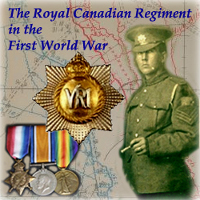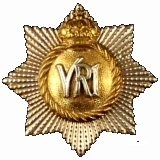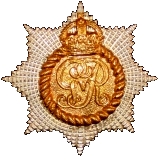
The First World War
An RCR Officer's Diary 1914-1918
DECEMBER 1915
The strength of the battalion in December was 37 officers and 988 other ranks.
Lieut Coupe was promoted Captain this month dating from August 26th.
The mud at La Clytte was very bad indeed, the transport lines were practically impossible. Two horses were in fact found disappearing into the mud on night by the Stable Picquet right up to their bellies.
On arrival in France every man was issued with a Field Dressing and a gas helmet which at this time consisted of a grey flannel bag treated with special chemicals with a celluloid window. This was carried in a waterproof envelope in a kharki drill satchel. In December a second helmet was issued of an improved pattern with glass eyepieces and a metal mouthpiece with a metal valve. It had been found that exhaling inside the gas mask decomposed the chemical in the mask, hence a mouthpiece was fitted. These masks were proof not only against chlorine gas which had been used by the enemy, but also phosgene, a later gas used by them, a gas which affects the heart.
At this time requests were made for al units to endeavour to obtain articles of German clothing, equipment, rations, stores, etc., etc., to ascertain if any substitutes were being used in manufacture of articles thus betraying the effect of the British Blockade on Germany's import of raw material, etc. Already the enemy had introduced paper into a great many articles. Sandbags and later harness and equipment were made of a special web of twisted paper thread giving the appearance of very coarse canvas.
About the middle of the month [Dec, 1915] an Infantry Brigade called the Corps Troops Infantry Brigade was formed under the temporary command of Lieut Col A.H. Macdonell, D.S.O., Comdg the Regiment. The temporary staff consisted of:-
Capt de Dombasle, R.C.R. - Bde Major
Capt H.T. Cock, R.C.R. - Bde M.G. Officer
Lieut Westmorland, C.P.A.S.C. (att The R.C.R.) - Bde Transport Officer
The troops forming the brigade comprised:-
- The Royal Canadian Regiment ( Maj Eaton)
- Princess Patricia's Canadian Light Infantry (Lt Col Buller, D.S.O.)
- 42nd Cdn. Bn., C.E.F. (Lt Col Cantlie)
- 49th Cdn. Bn., C.E.F. (Lt Col Griesbach)
This brigade only existed for a week being broken up when relieved of its task (the defence of Kemmel Hill) by the 1st Cdn. Cavalry Bde.
On 19th [Dec] the battalion moved from La Clytte via West Outre to billets in the vicinity of Berthen; P.P.C.L.I. Took over La Clytte Camp.
On the morning of 19th [Dec] following a very heavy bombardment a hostile gas attack was launched in the vicinity of Ypres North of La Clytte. The effect of this gas was even felt at La Clytte but no serious casualties were suffered. The Germans attacked after the gas but were repulsed on account of the new gas helmet which proved satisfactory enabling our troops to repel them. Some of our troops doubled in gas masks through the cloud without suffering any ill effects or even inconvenience.
On 20th [Dec] a brigade composing of the same troops as the Corps Troops Infty Brigade was formed under the command of Lt Col A.C. Macdonell, D.S.O., Lord Strathcona's Horse (cousin of our Commanding Officer). Known as 7th Cdn. Infty Bde, being the first brigade of the newly formed 3rd Canadian Division commanded by Major General Mercer, C.B.
Capt Cock was appointed Brigade Machine Gun Officer on 28th [Dec] and Lieut Fenton took over Machine Gun Section, Lieut Munn becoming Reserve Machine Gun Officer.
The 3rd Division consisted of 7th, 8th and 9th Bdes. 8th Bde commanded by Brig. Gen. V. Williams made up of 1st, 2nd, 4th and 5th Cdn. Mtd. Rifles Bns; 9th Bde Brig. Gen. Hill of 43rd, 52nd, 58th and 60th Cdn. Infty Battns.
The Canadian Corps was at this time part of the Second Army under command of General Sir H. Plumer.
The mud at La Clytte was very bad indeed, the transport lines were practically impossible. Two horses were in fact found disappearing into the mud on night by the Stable Picquet right up to their bellies. A bale and a half of hay and two horse rugs had to be used before the animals could be extricated and by the morning the rugs had disappeared completely. Five horses in the Artillery lines next to the battalion were suffocated. They had slipped in the mud and unable to extricate themselves were "drowned" in it.
On 18th [Dec] Field Marshal Sir John French G.C.B., O.M., G.C.V.O., K.C.M.G., relinquished command of the British Army in the Field in France and was succeeded by General Sir Douglas Haig. The following special order was published:-
"In relinquishing the command of the British Army in France I wish to express to the officers, non-commissioned officers and men with whom I have been so closely associated during the last sixteen months, my heartfelt sorrow in party with them before the campaign in which we have been so long engaged together has been brought to a victorious conclusion. I have, however, the firmest conviction that such a glorious ending to their splendid and heroic efforts is not far distant and I shall watch their progress towards this final goal with intense interest, but in the most confident hope.
"The success so far attained has been due to the indomitable spirit, dogged tenacity which knows no defeat, and the heroic courage so abundantly displayed by the rank and file of the splendid Army which it will ever remain the pride and glory of my life to have commanded over sixteen months incessant fighting.
"Regulars and Territorials, old Army and new Army have ever shown those magnificent qualities in equal degree.
"From my heart I thank you all.
"At the sad moment of parting my heart goues out to those who have received life long injury from wounds, and I think with sorrow os that great and glorious host of my beloved comrades who have made the greatest sacrifice of all by laying down their lives for their country.
"In saying goodbye to the British Army in France I ask them once again to accept this expression of my deepest gratitude and heartfelt devotion towards them and my earnest good wishes for the glorious future which I feel to be assured."
J.D.P. French
Field Marshal
Commander-in-Chief, The British Army in France.
18th Dec 1915
On 22nd [Dec] Captain de Dombasle left the battalion on appointment to the Royal Flying Corps.
Lieut Penniman was invalided to England and Captain Holloway appointed battalion Signalling Officer on alteration in establishment.
On 23rd [Dec] the following cablegram was sent to H.R.H. The Duke of Connaught:
"All ranks Royal Canadian Regiment send Christmas greetings to their Honorary Colonel."
Lieut-Colonel Macdonell
Christmas was spent in billets at Berthen. Communion was held in billets, while Mass was celebrated at Berthen Church.
The Commanding Officer, 2nd in Command and Adjutant carried out his usual custom of visting all companies. Dinners besides the ordinary rations slightly augmented, were added under Regimental arrangements with ham, mince pies, plum pudding, cigarettes, almonds and raisin with the ancient tot of rum.
Each man was given a leatherette writing wallet with note paper presented by the Woen of Canada Fund, chocolate, tobacco, cigarettes, games, magazines, cocoa, handkerchiefs and cards were received from the Canadian Field Comforts Commission. Tins of chocolate were received also from the Trinidad and West Indies Fund.
Christmas Cards were allowed to be sent home and greetings allowed on the Field Post Card.
The field post cards issued with rations usually at the rate of 1 or 2 per week were allowed to be sent anywhere at anytime requiring no censorship. The censoring of letters was one of the onerous duties of a company officer. It appeared to be very difficult for men to realize what was of military importance, or what was military information and what was not. The men were usually advised to endeavour to forget here was such a thing as a war when writing. Constant and stringent regulations and orders were issued on the subject and attention to their non-compliance often drawn attention to. A privilege was granted to all ranks to write letters on purely personal prvate or business matters and seal them in a green envelope (later changed to white with red registration mark on it). On the outside of this was a certificate which the writer signed with his rank and number certifying that no military information was contained in the envelope. These letters were censored at the base only and not by regimental officers. This permitted men greater freedom in writing knowing that the censor would not know who he was personally like a regimental officer. Any abuse of this privilege was heavily punished and often led to the withdrawal of green envelopes from the unit for a period.
Censoring of letters was extremely monstrous but on occasions certain things would catch the eye such as a letter written by a young soldier on first going to France when the battalion was way behind the line near La Clytte. This read "I must now close as the cannon's smoke is so thick I cannot see to write."
In the afternoon the men played games and in the evening nearly all companies had smoking concerts.
The Christmas of 1914 had seen the opposing forces fraternising but this year this was absolutely forbidden, and any form of holding communication with the enemy illegally was heavily punished. Two N.C.O's found guilty of this offence by a Field General Court Martial were sentenced to 3 years penal servitude. Another N.C.O. was sentenced to 6 months imprisonment with hard labour for breaking the censorship regulations, and a Private soldier was sentenced to two years imprisonment with hard labour for being found in possession of certain ornaments of the church.
The following message was sent by the King:
Another Christmas finds all the resources of the Empire still engaged in war, and I desire to convey on my own behalf and on behalf of the Queen a heartfelt Christmas greeting and our good wishes for the new year to all who on sea and land are upholding the honour of the British name.
In the officers and men of my Navy on whom the security of the Empire depends, I repose in common with all my subjects a trust that is absolute.
On the officers and men of my Armies, whether in France, in the East or in other fields, I rely with an equal faith, confident that devotion, their valour and their self sacrifice will under God's guidance lead to victory and an honourable peace.
There are many of their comrades now alas in hospital and to the brave fellows I desire with the Queen to express our deep gratitude and our earnest prayer for their recovery.
Officers and men of the navy and Army, another year is drawing to a close as it began in toil and bloodshed and suffering, but I rejoice to know that the goal to which you are striving draws nearer in sight.
May God bless you all and all your undertakings.
George, R.I.
The following reply was sent:-
The Army in France under my command desires to be allowed to express its warmest thanks to Your Majesty and Her Majesty the Queen for their gracious message received.
On behalf of the troops I respectfully beg Your Majesties to accept the most heartfelt wishes of all ranks for XMas and the new year and an expression of their firm and lasting determination to prove themselves worthy of the great trust which you Majesty reposes in us.
From Sir Douglas Haig.
Christmas Day 1915
On 29th [Dec] the battalion attended a gas demonstration and a lecture was given on the use of gas. 500 men underwent a test. While the test was going on 20 British Aeroplanes passed over on a bombing raid on Commines; this was the first air raid seen by the battalion.
On 30th [Dec] Major Eaton, Capt Balders, and Lieut Logan proceeded to the Canadian Mounted Rifles as instructors on the reorganization of those units as Infantry.
Four officers and some N.C.O's from Cdn. Mtd. Rifles were attached to the battalion to receive instruction. However, as they proceeded on leave immediately they arrived for instruction and returned to their Regiments immediately after, the instruction received was not particularly thorough.
- The O'Leary Collection; Medals of The Royal Canadian Regiment.
- Researching Canadian Soldiers of the First World War
- Researching The Royal Canadian Regiment
- The RCR in the First World War
- Badges of The RCR
- The Senior Subaltern
- The Minute Book (blog)
- Rogue Papers
- Tactical Primers
- The Regimental Library
- Battle Honours
- Perpetuation of the CEF
- A Miscellany
- Quotes
- The Frontenac Times
- Site Map

![]() The RCR in the Great War
The RCR in the Great War
![]() War Diary
War Diary
![]() Battle Honours
Battle Honours
![]() Battle Bars and The RCR
Battle Bars and The RCR
![]() The RCR Battle Bar Ledger (pdf)
The RCR Battle Bar Ledger (pdf)
![]() Honours and Awards
Honours and Awards
![]() Roll of Honour
Roll of Honour
![]() Prisoners of War
Prisoners of War
![]() Cemetery List
Cemetery List
![]() Cemetery Map
Cemetery Map
![]() Courts Martial
Courts Martial
![]() Officers
Officers
![]() RSMs of The RCR (1914-1919)
RSMs of The RCR (1914-1919)
![]() NCOs and Soldiers
NCOs and Soldiers
![]() An Officer's Diary (1914-1918)
An Officer's Diary (1914-1918)
![]() Recollections of a Nonagenerian (R. England) (1916-1919)
Recollections of a Nonagenerian (R. England) (1916-1919)
![]() On to Bermuda (1914-15)
On to Bermuda (1914-15)
![]() England and France 1915-1916 (Hayes; 1931)
England and France 1915-1916 (Hayes; 1931)
![]() Overseas with The Royals (1915)
Overseas with The Royals (1915)
![]() Regimental History Pamphlet (1917)
Regimental History Pamphlet (1917)
![]() Amiens (1918)
Amiens (1918)
![]() Cambrai (1918)
Cambrai (1918)
![]() Monchy-le-Preux (1918)
Monchy-le-Preux (1918)
![]() Under-aged Soldiers in The RCR
Under-aged Soldiers in The RCR
![]() Not All Were Volunteers; The RCR and the Military Service Act
Not All Were Volunteers; The RCR and the Military Service Act
![]() Sentenced to Death by Court Martial
Sentenced to Death by Court Martial
![]() The 7th Trench Mortar Battery
The 7th Trench Mortar Battery
![]() A Regimental Goat
A Regimental Goat
![]() Regiment and Family, Bermuda 1914-15
Regiment and Family, Bermuda 1914-15
![]() "March the Guilty Bastard In"
"March the Guilty Bastard In"
![]() Surrendered as Stowaway
Surrendered as Stowaway
![]() Re-Visiting the Great War Roll of Honour for The RCR
Re-Visiting the Great War Roll of Honour for The RCR
![]() Canadian Corps Trench Standing Orders (1916)
Canadian Corps Trench Standing Orders (1916)

